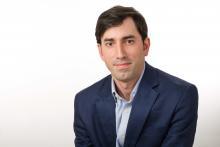Experimental Entrepreneurs
Steve Jobs dreaded turning 30, because he knew it would be fatal to his creativity: "It's rare that you see an artist in his 30s or 40s able to contribute something amazing." Mark Zuckenberg was even more blunt -- "young people are just smarter" -- and his Silicon Valley neigbor Vinod Khosia agreed: "People under 35 are the people who make it happen."
The economic historian Jonathan Hughes wrote that with the Model T, “Henry Ford and his men made a revolutionary machine and a revolution. They made a light, strong, powerful, efficient, simple, dependable and cheap automobile.” Hughes believed that the Model T made the automobile” perhaps the most powerful instrument of egalitarian American democracy,” and judged that “Ford liberated the common man on a greater scale than any hero in history”- surely a dent in the universe. Yet the Model T was not the product of a momentary stroke of genius, but rather the result of a painstaking process of more than 15 years in duration, that began when Ford, working nights after his day job as an engineer for the Detroit Electric Co., built a one-cylinder engine in his kitchen, then proceeded to construct a motor car by hand in the woodshed behind his home. When Ford introduced the Model T, he was 45 years old.
Henry Ford worked by trial and error, and never accepted any result as final: he declared that “We will rip out anything once we discover a better way,” and his workshops were marked by constant experimentation. His plan for personnel was perpetual ferment, with no formal titles or duties, but constant competition. A fellow mechanic early in Ford’s career recalled that “he always figured that there was some little improvement he could make,” and he maintained that attitude toward all his projects throughout his life.
Steve Jobs doubtless would have considered Henry Ford an anomaly, a rare case of an entrepreneur who innovated well past the first blush of youth. In fact, however, Ford was an archetypal experimental entrepreneur. Experimental entrepreneurship is often overlooked: experimentalists are less flamboyant than their conceptual peers, and their innovations arrive gradually and less conspicuously (even Ford’s Model T arrived only after a series of earlier cars – Models A, B, C, K, N, R, and S). Always uncertain, they work patiently to innovate, cautiously proceeding by trial and error in pursuit of ambitious but imprecise goals. They gain knowledge and judgment over the course of their careers, and often arrive at their greatest achievements late in their lives.
Many recent experimental entrepreneurs can be cited, in a wide range of activities. At the age of 52, Ray Kroc signed a contract with Mac and Dick McDonald that gave him the right to franchise copies of their California hamburger drive-in; he opened his own first McDonald’s a year later. Michael Young, who declared “I have never had an idea that I was sure about,” became the first chairman of England’s Consumers’ Association at 42, and founded the National Extension College, the forerunner of the Open University, at 48. Sam Walton opened Wal-Mart No. 1 in Rogers, Arkansas, at 44, and discovered “that there was much, much more business out there in small-town American than anybody, including me, had ever dreamed of.” At 53, Warren Buffett wrote in his annual letter to Berkshire Hathaway shareholders that “your chairman, always a quick study, required only 20 years to recognize how important it was to buy good businesses.” Managing radio stations with the philosophy “Try this, and if that doesn’t work, try something else,” Bill Siemering became National Public Radio’s first director of programming at 36, and founded Developing Radio Partners, to help independent radio stations in Africa and Asia, at 69. Later recalling that “I was walking blind and learning as I went along,” Muhammad Yunus reluctantly gave up an academic career to manage his Grameen Bank at the age of 39, and 27 years later shared the Nobel Peace Prize with the bank in recognition of microcredit as a tool in the fight against poverty. At 45, after making more than 5,000 prototypes over 14 years, James Dyson made his first fully functional cyclone vacuum. His formula for entrepreneurial success: “Patience, patience, patience.”
Steve Jobs believed that an entrepreneur’s most valuable trait was a beginner’s mind. Jobs was a great entrepreneur, but a very bad scholar of entrepreneurship. He completely failed to recognize that successful entrepreneurship could be a result of wisdom gained from years of experience. Charlie Munger attributed Warren Buffett’s success to the fact that he is a “learning machine.” This may be an apt characterization of all the experimental entrepreneurs considered in this article. All immersed themselves in an industry and never stopped working to learn all they could about it. None ever stopped trying to improve their products, no matter how successful they became. And although all were learning machines, with time and experience all developed judgment and wisdom in their chosen trades that no machine has been able to match.

















